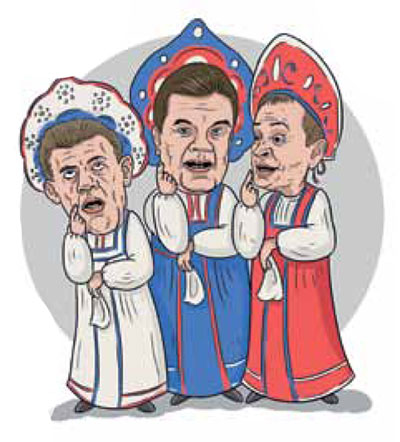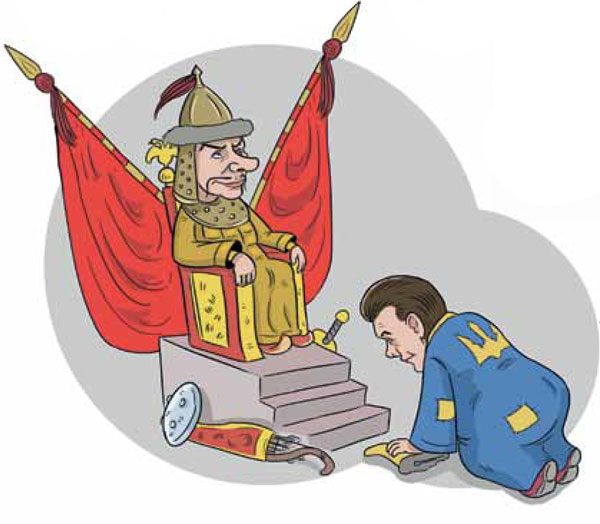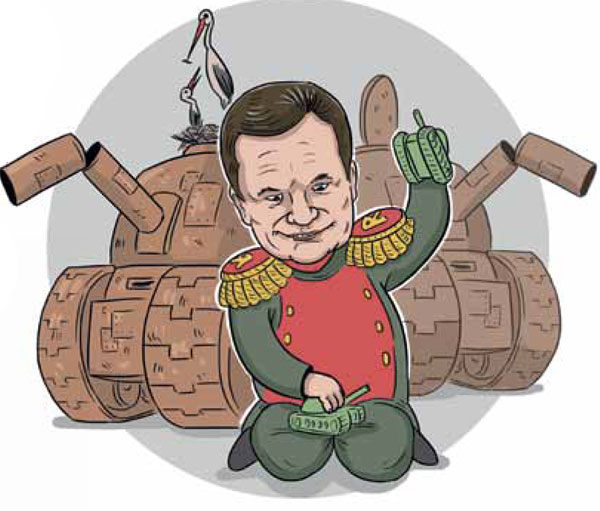The meeting of Viktor Yanukovych and Vladimir Putin in Yalta proved that Mr. Putin is waiting for his Ukrainian peer to lay the necessary groundwork to transfer Ukraine into the Kremlin’s sphere of influence.
While the Ukrainian Presidential Administration claims that it has the situation under control and will manually adjust the country’s direction based on a multi-vector policy concept, Moscow’s tactics signal that the Kremlin is counting on current trends in the Ukrainian government’s domestic and foreign policies, if continued, to inevitably lead Ukraine to a place where it will no longer be able to withstand Russian pressure. Moscow simply needs to wait until the relevant factors reach a critical point where Kyiv becomes vulnerable. Mr. Yanukovych is definitely moving in that direction. Clearly, his self-serving actions ultimately benefit the Kremlin. His purposeful march toward totalitarianism has already isolated him from the West. Moreover, the imposition of a Eurasian model of business and government relations will push local oligarchs closer to Putin. Yet, there is the impression that someone in his inner circle keeps offering the president ideas that he is not interested in because they do not improve his electoral score, yet their implementation still works in the Kremlin’s favor. These include the language law that is fueling a divide in Ukraine, or the way in which the jailed Yuriy Lutsenko is being treated, which enhances the impression in the West that Mr. Yanukovych has chosen a path similar to Belarus’s Lukashenko.
Given these current developments, The Ukrainian Week suggests that a scenario in which Ukraine falls under Russian control may become a reality very soon.
1. Increased pressure; violation of democratic freedoms and values illustrated by the imprisonment of political opponents; unjustified restriction of civil protests and freedom of assembly; growing pressure on mass media (the latest facts include criminal cases against lb.ua and the general director of the TVi television channel).Recent trends suggest that all of these elements will grow more visible as the election draws nearer. This path isolates Ukraine from European society and brings it closer to the authoritarian model of a “sovereign democracy” similar to that of Russia and Belarus. This will make Ukraine’s integration into Mr. Putin’s new imperialistic project called the Eurasian Union much easier.
2. Political isolation from the EU and the civilized world resulting from the previous step. Yanukovych’s ongoing rejection of Europe’s demands to pursue democratic values and human rights slowly increases the number of those who support the complete isolation of the current Ukrainian regime and will make their position more justified and convincing. If the government engages in the radical distortion of voting results in October’s elections and crushes the massive protests that are likely to occur in that event, Ukraine risks losing its image as “the single greatest democracy of the CIS” altogether, while Yanukovych may waste the few remaining arguments that still make him different from Lukashenka. Undoubtedly, the Kremlin would welcome the Belarus scenario in Ukraine.
The signing of the FTA Economic Association Agreement and the liberalized visa regime are merely the EU’s attempts at signaling that its doors remain open to Ukraine, but only if the government reforms its policies or is changed altogether. In an interview for the Razumkov Center, Jose Manuel Barroso, President of the European Commission, and Catherine Ashton, High Representative of the Union for Foreign Affairs and Security Policy, confirmed that the Association Agreement cannot come into effect under the current circumstances and “the key to moving forward in our relationship is in Kyiv, not Brussels. Our offer is on the table, as shown by the signing of the Association Agreement. However, the fundamental values needed for political association appear to be absent. It is up to Ukraine to demonstrate its political will by taking clear and concrete steps to reverse the negative trends we have seen since 2010.”

3. Sharing the neighbour’s culture. The language law sponsored by Party of Regions MPs Kolesnichenko and Kivalov, if enacted, will clear the path for the total Russification of Ukraine, rather than protecting regional languages or supporting a single official language. Party of Regions MP Olena Bondarenko recently demonstrated in Rivne that speaking Ukrainian was burdensome to her, thus confirming that the implementation of the language law is necessary so that Russian speakers do not have to adapt to any other language. The Russian government and Putin himself have openly stated that Russian language and culture serve as key civilizational markers and form the basis for informational and ideological expansion, while playing key roles in the implementation of neo-imperialistic projects in the post-soviet realm.

4. Federalization of Ukraine leading to a potential split. The political project called Ukrainian Choice launched by Viktor Medvedchuk, whose daughter is a goddaughter of Vladimir Putin, is blatantly flaunting pro-Russian slogans and gaining ground with zero protest from the Presidential Administration. Anatoliy Mohyliov, the Crimean Premier, is playing along. He initiated the expansion of Crimea’s powers of self-government and the upgrade of the region’s Constitution to a position of equal status with that of the central government in Kyiv. This separatist initiative did not face significant resistance from the president.
The only benefit of federalization may be broader self-governance. That is the role of the federal system in most countries that use it. In Ukraine, however, similar initiatives are proposed for a completely different purpose, serving instead as a tool for preserving inter-regional differences and disparities, enhancing the effect of “broken identity.” Its supporters’ key motivation is to appeal to the various civil and geopolitical orientations of the regions. This may signal that the proponents of federalization are merely setting the stage for Ukraine’s destabilization and the disruption of its territorial unity. Thus, federalization may serve as a bulwark against the arrival of pro-European forces to power, which would threaten an irreversible split from the Russian-Eurasian post-imperial space.
5. Ukrainian oligarchs coming under direct control of the Kremlin; loss of economic sovereignty. The Eurasian model of government-business relations is being actively imposed in Ukraine. Ukrainian society, unlike that of Russia, radically opposes this system. In these circumstances, Ukrainian oligarchs find it safer to cede to Putin’s terms rather than remain under Yanukovych’s control, as their mindset is closer to the Russian model.
In fact, Ukrainian oligarchs have never identified themselves as inherently Ukrainian. They have always been part of a post-soviet business elite that aims to seize its country’s economic resources for its own use without creating any new potential for them. Aside from Khodorkovsky, Russia has Abramovich and Deripaska, who live in luxury in exchange for staying out of politics and accepting their inferiority to Mr. Putin. Under certain circumstances, most Ukrainian oligarchs could view this model as perfectly acceptable. After all, some are already merging with Russian financial and industrial groups (as evidenced by the fact that Serhiy Taruta and Viktor Pinchuk, as well as others, have sold their steelwork assets to Russians).

Meanwhile, many analysts view Dmytro Firtash’s business group as Gazprom’s agent in Ukraine, whose goal is to buy up strategic assets in sectors related to the gas market and later hand them over to the Russian monopolist. The only question seems to be the price the group will be paid for this mission (whether in cash or minority stakes at Gazprom). This is all happening against a backdrop of growing debt owed by Ukrainian companies to entities affiliated with Gazprom (Naftogaz Ukraina recently opened a credit line worth USD 2bn with Russia’s Gazprom Bank). Meanwhile, the planned reorganization of Naftogaz could make it easier for the Russian monopolist to gain control over distribution networks in Ukraine and the instruments of consumer pressure. Thus, Kyiv is actually becoming addicted to Russian rubles in addition to Russian gas.
6. Refusal to integrate into the European collective defense system (NATO) and unfeasible declarations of neutrality that serve to deliberately weaken Ukraine’s defense capacity.All this leaves Ukraine vulnerable to potential threats to its territorial integrity and sovereignty. The Ukrainian military is being commercialized and its needs are being neglected while the Russian military grows more powerful and better funded. This may encourage many Ukrainian military officers to support the idea of coming under Russia’s control in order to meet their own professional interests.

7. Progressive de-legitimization of the government culminating in the rigging of October’s election results.The discrediting of legitimate democratic parliamentary election methods may provoke the frustrated majority of voters to seek alternative ways of changing the government. Attempts by pro-Russian forces supported by the Kremlin to use instruments of direct democracy (referendum) to manipulate and undermine the state will be especially dangerous in this situation. Such circumstances would exacerbate the threat of Ukraine’s destabilization and the external modeling of its future in line with Putin’s neo-imperialistic project.

